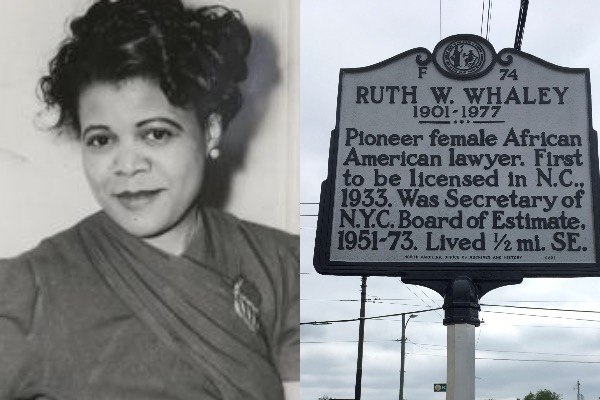The first Black woman licensed to practice law in North Carolina had a historical maker named in her honor on a highway in her hometown, Goldsboro, on Wednesday.
Ruth Whitehead Whaley received her license to practice law in the state in 1933, but the license was ceremonial, said Ansley Wegner, the administrator of the Highway Historical Marker Program. Even though Whitehead Whaley graduated at the top of her class, she could not get past racism in the South.

“She couldn’t easily practice law here so she had to move to New York. But she still came back and went through the process and got her license here. I think that’s a real interesting side of the story,” Wegner said.
Whitehead Whaley made an academic breakthrough as the first Black woman to enroll at Fordham University in New York. In 1920, Whitehead Whaley wrote that there were only four Black female attorneys in the country. She graduated atop her class in 1924 and passed the bar exam in 1925. Seventeen lynchings of Black people were recorded that same year.
Although she was unable to practice law in her home state, Whitehead Whaley thrived in her professional career in New York. Whitehead Whaley was also one of the first Black women to practice law in the Northern state.
She became an expert in civil service law and made waves representing Black government workers in termination cases. Whitehead Whaley ran a private practice until 1944.
By 1949, there were fewer than 150 Black female attorneys in the country, and less than 66 percent practiced law, Whitehead Whaley wrote in her essay, “Women Lawyers Must Balk Both Color and Sex Bias.”
Whitehead Whaley wrote about the high expectations placed on her as a pioneer in the field, noting that females had to outperform their male counterparts and take the blame for their errors. Lest one of these men “forgets to be gallant in his thinking and the overlooked errors of a male colleague become the colossal blunders of a woman.”
Yet Whitehead Whaley maintained her love for the legal field: “My admiration is undimmed,” she wrote.
In 1945, Whitehead Whaley ran for a New York City Council seat, pioneering in the political realm as one of the first Black women ever nominated by a major political party. She was appointed secretary of the New York City Board of Estimates, where she collaborated with the city council from 1951 to 1973.
She was also the first president of the New York City National Association of Negro Business and Professional Women and president of the National Council for Negro Women.
Whitehead Whaley died in December 1977. She has since received several honors for her contributions to the legal field. In 2014, she was inducted into Fordham University’s Hall of Honor.
Students who perform among the top 25 percentile in each law school class are recognized as Ruth Whitehead Whaley Scholars. In addition, Fordham’s Black Law Students Association presents an annual Ruth Whitehead Whaley Trailblazing Alumnus Award to alumni who embody her “bold spirit and commitment to excellence.”


